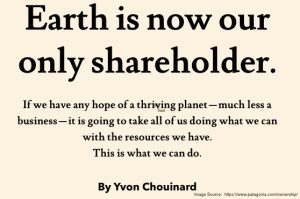The search for the Holy Grail, privacy, profit & global good: Patagonia
By Luis Delgado | October 27, 2022

As we focus on Mulligan, Koopman, et. al and their “Analytic for mapping privacy” it is easy to mistake the lofty goals of privacy as ideals not compatible with business, profits, and especially the most ambitious capitalistic goals. Yet a company has led the path of doing good while breaking revenue records for itself. They lead with a spirit of transparency and good will, not without fault, but with a clear desire to outweigh the negative effects on the earth. Despite inflationary and consumer discretionary spending pressures, those profits continue to rise. I explore the structure of Patagonia, and how it could map to modern tech companies and the careful balance of privacy and top/bottom lines. (Mulligan, Koopman, et. al., 2016)
Patagonia’s core values include:
- “Build the best product”
- “Cause no unnecessary harm”
- “Use business to protect nature”
- “Not bound by convention” (Patagonia.com/core-values, 2022)
Within these principles we see a clear venture into the execution of business and sales. How are these balanced with a desire to good? Is that even possible?
Companies like Patagonia are not necessary. No one really needs expensive brand jackets and gear. They are created for the sake of making profits for a company. The innovation comes in being clear about that goal while creating plans to balance that impact through innovation and measurable revenue going towards doing “good”. The concrete actions Patagonia has taken include:
- Historically giving away 1% of profits to earth preservation causes.
- Creating a trust with the sole intent of global protection.
- Giving away the 2% share owned by the founder’s company.
- Giving away the remaining 98% of common shares to the same trust.
- Focusing on creating long lasting products.
- Creating channels for secondhand sales.
- Providing all products with lifelong repair support.
(Outside Magazine, Oct 2022)
These actions could easily adversely affect the bottom line of the company, but it is arguably exactly why their revenue has risen. The company’s honest execution, transparency, and focus away from profits has created a customer following attracted waves of new business.
These principles mirror the underlying goals of the Federal Trade Commission’s views for current and future legislation (FTC, Mar 2012). Pillars such as clarity of privacy practices, clear consent, and stronger transparency guide Patagonia’s business model. It is no surprise that Patagonia’s privacy policy also reflects these values. It includes clearly defined systems for information safeguarding, user correction, and customer choice (Patagonia.com/privacy-policy.html, 2022).
With this in mind, I attempt to create a parallel structure that utilizes “dimensions” (Mulligan, Koopman, Doty, Oct 2016), to describe company policy and execution in terms of privacy and sales:
- Object: What is privacy for? / Who does revenue benefit?
- Justification: Why should this be private? / Why care about the environment and customers?
- Contrast concept: What is not private? / What unavoidable harm does the company produce?
- Target: What is privacy about and of what? / Besides top and bottom line, who and what benefits from revenue?
- Action / Offender: What/who defines a privacy violation? / What does a failure to act ethically look like? To customers? Towards global preservation?
If Patagonia can essentially reinvent itself with a focus on the earth and on customers and be incredibly successful, could that create a framework for other companies? Could it become a framework for legislation at the micro and macro level? I believe it can, and the case for it has been proven by many companies who are pivoting in this direction. If these companies could shift the status quo of what it means to be a profitable corporation, then could this influence the greater public to not only endorse, but expect this from modern business?

I believe that at many points, the study of clearcut ethical privacy practices can seem overwhelming to execute and to enforce, but examples like Patagonia show us that not only is it very much doable but can create greatly benefit not just the environment affected by a company, but the company itself.
References:
- Mulligan D., Koopman, C., Doty, N. (October 2016), Privacy is an essentially contested concept: a multi-dimensional analytic for mapping privacy. The Royal Society Publishing.
- Federal Trade Commission (March 2012), Protecting Consumer Privacy in an Era of Rapid Change.
- Peterson, C., (Oct 2022), Patagonia Will Donate $100 Million a year to Fight Climate Change. What Can that Money Accomplish?, Outside Magazine. https://www.outsideonline.com/business-journal/brands/patagonia-new-corporate-structure-analysis/
- Patagonia’s privacy policy (Oct 2022), https://www.patagonia.com/privacy-policy.html
- Patagonia’s core values (2022), https://www.patagonia.com/core-values/
